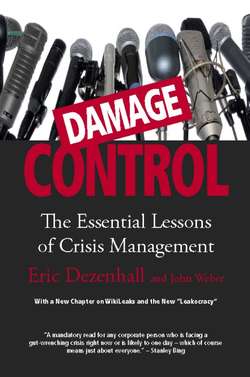Читать книгу Damage Control (Revised & Updated) - Eric Dezenhall - Страница 20
На сайте Литреса книга снята с продажи.
THE LESSONS
ОглавлениеHuman nature makes us want to find fault in hindsight with how things were handled, and, surely, error can always be found. In the case of the alleged sudden acceleration of Audis, however, what became clear early on was that converging forces were creating an environment ripe for blame: sympathetic victims; a compelling narrative; a scary and not-readily-explained phenomenon; public outrage and hysteria; a spontaneous media feeding frenzy; consumers with the time, energy, and money to litigate; opportunistic plaintiffs’ lawyers.
Audi, a German company whose motto at the time was “The Art of Engineering,” attempted to fight back on the only wavelength it understood: the Facts. The audience, however, wasn’t processing information; it was processing emotions. Anxious people, by nature, don’t ask, “What are the facts?” They ask, “Whom do I identify with?” In a battle between a grieving mother and the laws of physics, tears overpower statistics.
Barely a week has gone by in the twenty-plus years since the Audi debacle that we don’t wonder what might have been done differently. We are not convinced that all of the resources (plus all the hindsight) in the world could have pulled Audi out of the 60 Minutes debacle. Sometimes the forces lined up against a company are simply too strong, even against a deft strategy deployed by clever handlers. Failure is failure, regardless of its cause. Lessons, however, can still be learned.
In retrospect, the greatest lesson of the Audi affair is that when an avalanche of blame is inevitable, unconventional methods of response must be entertained. Does it pay, for example, for a company to embrace the public relations industry’s consistent advice to convey warmth and caring in the face of an attack by bitterly motivated adversaries? Part of the reason for adopting a conciliatory position is the hope that your critics will treat you more humanely. But what if your critics come to view your niceness as a sign of weakness and attack even harder? In the Audi case, there was no correlation between how much empathy the company conveyed to its critics and a cessation in hostilities. In today’s adversarial climate, if you believe you are being wrongly attacked, hitting hard and hitting first should be high on your list of options.
There is also a lesson to be learned in paying attention to changes in the cultural and technological climate. In 1986, 60 Minutes was the gold standard of television journalism. There was nowhere else to go, no media court of appeals. The other network programs ran with the same kind of narrative: Villain (Audi); Victim (Joshua Bradosky); and Vindicator (Ed Bradley).
Today there’s another media game in town—games, actually. There are numerous networks, blogs, and other media that one can approach in a marketplace assault. We now know not to trust theater arranged by television networks that have their own competitive agenda. While 60 Minutes never had to apologize for its rigged Audi test despite the damage it caused, Dateline NBC and its top executives were badly embarrassed in 1992 when the show’s producers chose to demonstrate the flammability of a vehicle by rigging it with explosives.
Today communicators can introduce alternative narratives, including indelicate ones that require self-styled victims to pay a serious price if their stories fail to hold water. In the case of sudden acceleration, this would have included a more vigilant campaign to discredit the alleged “victims.”
Litigation against a media outlet, which would have been deemed unthinkable in 1986 on the grounds that “it’s too messy,” is now fair game when an entire company is on the line. Moreover, with recent media debacles and the retirement of old-line standard-bearers such as CBS News’s Dan Rather, news organizations are more self-critical than they were in the 1980s, which is a net positive for aggrieved parties.
For every activist group that emerges to attack a product, a new—and equally legitimate—grassroots group can be mobilized to challenge it. Grievance groups, while often anchored in respectable desires, are sometimes corrupted by the agendas of trial attorneys and the whims of media cycles. One of the prime movers in the attack on Audi was the Ralph Nader–founded Center for Auto Safety. Nader’s reputation for doing good works aside, the organization was shameless in its trafficking in the canard of sudden acceleration.
There was a time when any attack on a business target was considered noble and any defense somehow underhanded because of the taint of profit making. The attackers no longer wear the impenetrable mantle of virtue that they once did, and the consumer media, beholden to an antibusiness ideology from the 1960s through the 1990s, now, because of a series of journalistic debacles, recognize that not all journalism that results in the destruction of an enterprise is good journalism.
Perhaps the antiquated, gentler school of public relations plays an important role in confronting nuisances and problems. But when a crisis or marketplace assault comes courting, the old elixirs should be relegated to the memories of a simpler time when the stakes were lower. Where there was once deference in the face of a crisis and marketplace assault, there now is resistance. And there should be.
